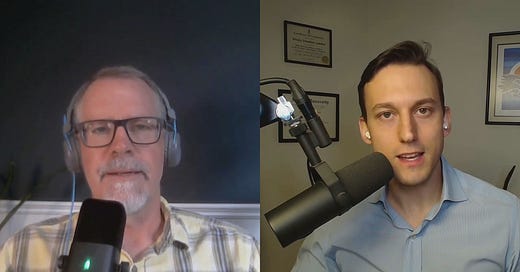"Connection with unsafe people equals rejection. What they have to relearn is that connection with safe people actually leads to everything you're looking for." - Tim Fletcher
The Masculine Trauma Most Men Don't Recognize
In a revelatory conversation with trauma specialist Tim Fletcher, we uncovered why traditional approaches to men's mental health miss the mark entirely. Fletcher, whose programs achieve a 68% recovery rate (far above industry standards), shared insights that challenge everything we think we know about masculine strength and emotional resilience.
The Hidden Epidemic
Fletcher's research reveals that 97% of people struggling with addictions also carry complex trauma—but for men, this trauma often masquerades as strength. What our culture calls "toxic masculinity" is actually a survival adaptation that begins in early childhood. When boys are told "big boys don't cry" or "quit being so sensitive," they learn that emotions make them vulnerable to further harm.
The Superior-Inferior Trap
One of Fletcher's most striking insights involves how trauma creates relationship templates. Children in complex trauma situations learn to see relationships as superior-inferior dynamics. As adults, men often swing between people-pleasing (inferior position) and controlling behaviors (superior position), driven by a subconscious fear of abandonment.
The Connection Cure
The solution isn't more willpower or traditional therapy focused on symptom management. Fletcher advocates for gradual, authentic connection with safe people—particularly other men who are also learning to be vulnerable. His approach recognizes that healing happens in relationship, not isolation.
Key Takeaways:
Process addictions (work, sex, food, gaming) often precede substance addictions
Emotional numbness isn't strength—it's unprocessed trauma stored in the subconscious
True masculine strength includes the full range of human emotions
Healing requires moving through fear, not avoiding it
Connection with safe people is essential, not optional
Resources to Explore Tim Fletcher's Work:
Website: timfletchercode.ca
YouTube: Tim Fletcher (60+ characteristics of complex trauma)
REACT Program: In-person intensive treatment
LIFT Program: Online trauma recovery course
Self-study courses on anger, codependency, and relationship patterns
This conversation challenges every man to ask: What if the very things I think make me strong are actually keeping me trapped? Fletcher's work offers a roadmap for authentic masculine healing that honors both strength and vulnerability.












Share this post